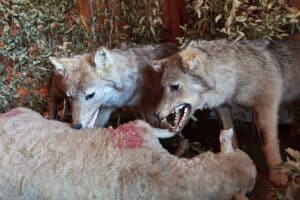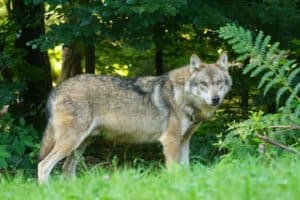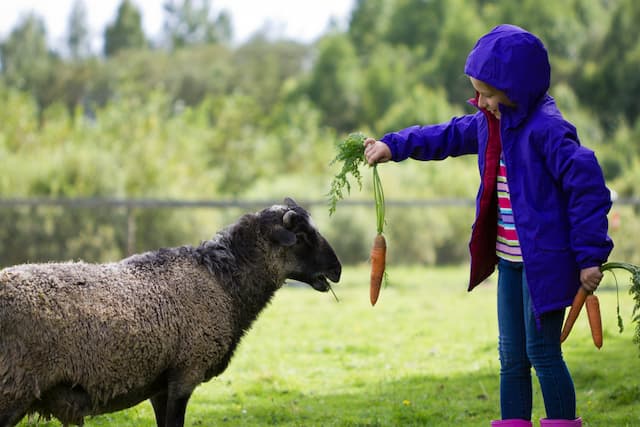The worst thing a farmer can experience is losing his flock to predators. The best defense mechanism for sheep is to stay in a group, but this also doesn’t help against stronger and larger attackers. This begs the question, do wolves eat sheep?
Yes, wolves will kill and eat sheep. They primarily do it for sustenance and survival. However, some people claim that wolves kill sheep for sport and fun, particularly when they consume the carcass partially.
Sheep are especially vulnerable to predatory attacks because of their poor instincts and defenselessness. When frightened, they run away, and they aren’t the fastest.

Why Do Wolves Eat Sheep?
The main reason wolves eat sheep is the latter’s lack of natural defensive instincts. When attacked, sheep run in circles instead of fleeing, making it easier for the wolves to strike. Also, sheep are weak and slow, which adds to their vulnerability.
Additionally, the running around in circles in sheep causes panic in the flock and thus, there are usually multiple deaths due to sheep stampeding on each other.
When a pack of wolves kills sheep, they will eat until they’re full. Sometimes, they might leave carcasses that have been barely eaten.

How Does A Wolf Attack A Sheep?
If wolves attack your sheep, they often bite the top of the neck and lunge from the rear of the animal. This causes the sheep to bleed profusely, go into shock due to blood loss and eventually succumb to the injuries.
Do wolves eat lambs? Yes, wolves will also attack lambs and kill them in a similar manner as discussed above. However, they will often carry away lambs to go eat their carcasses elsewhere.
Do Wolves Kill for Sport?
Like other predators, wolves occasionally engage in ‘surplus killing’, an uncommon behavior where predators kill more than they can consume immediately.
Wolves surplus killing is common in winter when the animals need more food to keep warm and survive the unfavorable conditions. However, nature isn’t wasteful – what the wolves don’t consume is a feast for other animals.
In the case of sheep, wolves can kill an entire flock, resulting in the perception that they do it for fun. However, this isn’t true.
In reality, the chaos caused by the sheep’s poor defense triggers the wolves to kill. Remember, it’s natural for predators to kill. Sometimes, the sheep stampede on others because of panicking.
Additionally, wolves are wary and alert. They can abandon a carcass halfway if distracted by humans or other predators.
Farmers usually realize that wolves attacked their sheep long after they’re gone. However, some studies show that wolves return to their food repeatedly and east it entirely.

How Do You Keep Wolves From Killing Sheep?
Sheep farming comes with its fair bit of drawbacks like wolves eating sheep. However, if these happens for the first time, you can adopt some measures that will help prevent future attacks.
Shepherd
If you love grazing your sheep in large, open fields, it helps to employ a shepherd. Besides directing the animals to food and water, the shepherd monitors and protects the flock against predatory attacks.
During the day, the shepherd keeps the sheep in a bunch, making them less vulnerable to attacks. They use the other measures mentioned below at night to keep the animals safe. As mentioned earlier, wolves fear the sight and sound of humans and flee instantly.
RELATED: Can Sheep Live without a Shepherd? (Reasons They Need a Shepherd!)
Electric Fencing
This is an effective way to protect your sheep from being eaten by wolves. However, you will need the right type of fence. The fence type you choose should be low (0.6ft) near the ground, with enough wires beneath.
This ensures a wolf doesn’t pass underneath it. It should also be high (4.5ft) so that it’s hard for wolves to jump over. Once wolves learn about electric fences, they tend to avoid such places. However, its important for you to maintain it regularly to ensure it’s working.
READ ALSO: Do Sheep Jump Fences? Reasons And Best Fence Ideas
Guard Dogs
A shepherd will more easily protect your sheep if you get them a guard dog. Dogs also help to prevent attacks from larger predators like bears and cougars.
It’s worth noting that guarding livestock is specific to select dog breeds. Akbash, Anatolian, Boxer, German Shepherd, Great Pyrenees, and Tibetan Mastiff are a few select breeds that will deter predators and alert the shepherd of their presence by barking aggressively.
The level of wolf activity in your region, bunching of sheep, and the breed’s unique characteristics determine the number of guard dogs needed to protect your flock. Some species stay close to the sheep, while others roam around the grazing fields looking for threats.
Guard dogs work best with herders. They might have the sense to detect predators and the strength to deter the wolves, but in some cases, human presence is required to prevent the loss of lives.
Using guard dogs near wolf dens and breeding zones isn’t advisable. Wolves can consider the dogs as intruders and a potential threat to their pups, prompting deadly attacks.
If you must use dogs in these areas, it’s wise to use additional deterrents to help protect the dogs and sheep.

Scaring
Scaring keeps wolves at bay by simulating human presence. It’s an effective means of deterring wolves from small areas. However, if you have a large flock, it only works in confined sleeping areas.
You can use strobe lights and starter pistols to scare wolves. The problem with using these is that the animals figure it out over time.
For this reason, targeting multiple senses with a rotating array of deterrents is wise to stave off pattern recognition.
Isolation
Wolves kill sheep that are weak easily. With this in mind, you can use it to your benefit by isolating old, weak, and sick sheep from your flock since they put healthy animals at risk of predatory attacks. It might not work 100%, but it reduces the risk of large-scale attacks.
Trickery
Recent studies show that tricking wolves into thinking sheep meat is disgusting is more effective than scaring and isolation. Trickery involves planting nauseating microcapsules into carcasses to lure wolves.
When the predator vomits after consuming the flesh, the brain conditions it into believing that dead sheep aren’t worth it. However, this research currently works for captive wolves and is yet to be tested on wild predators.
Killing
The last resort to protecting your sheep is to kill the predator, especially if it’s a lone wolf. However, this is impractical because wolves are an endangered species in many states.
While we all agree wolves eat sheep and can result to massive losses to the farmer, we highly discourage killing.
Characteristics of Wolves
Wolves aren’t exactly the largest predators. However, they make up for their diminutive stature with collaboration and intelligence.
They work together to take down larger animals or flocks, prey that may have otherwise been elusive. This explains why wolves kill sheep in large numbers when they attack them.
Wolves are opportunistic predators. They test their prey for weaknesses and vulnerabilities using vision, hearing, and the sense of smell.
Unlike stalkers that rely on the element of surprise and short, intense energy bursts to land their prey, wolves are more enduring. They chase their prey until they find the right opportunity to strike.
Wolves eat when the right opportunity represents itself, and their feeding patterns are uneven. During summer and autumn, wolves undergo periods of abundance and relative fullness. In winter, they withstand long starvation periods.
Final Thoughts
Do wolves eat sheep? Yes, and one of the reasons wolves eat sheep is because they are weak animals. The best way to protect your sheep is to combine multiple non-lethal measures, hoping scientists will innovate more effective methods.
That said, it’s almost impossible to develop a comprehensive defensive mechanism against wolves – like other animals, they also leverage their smartness to survive.
RECENT POSTS
Are Sheep Smarter Than Goats? (4 Facts To Know!)
Can Sheep Eat Bread? Find Out Here
11 Adorable Sheep Breeds With Black Face You’ll love




